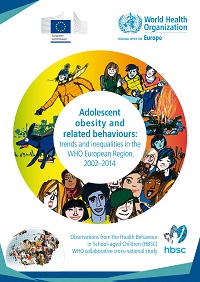Less than 50 per cent of UK adolescents eat fruit or veg daily

Less than 50 per cent of adolescents in the UK eat fruit or vegetables every day, according to the latest research from the University of St Andrews.
However, in a new international study, researchers also found that young people in the UK are eating fewer sweets and drinking less fizzy juice than they did 15 years ago.
The findings are part of an international WHO (World Health Organization) report into childhood obesity to be presented at a major meeting in Portugal today (Wednesday 17 May 2017). The report, which looked at the health and wellbeing of young people around the world, examined their behaviours over a 12 year period (2002 to 2014).
The study – coordinated by Dr Jo Inchley at St Andrews – found persisting inequalities and a rise in obesity among young people in Europe, particularly Eastern Europe.
On average, the report suggests that 4 per cent of adolescents are obese which equates to over 1.4 million young people across Europe. Obese children are at greater risk of type 2 diabetes, asthma, sleep difficulties, musculoskeletal problems and future cardiovascular disease, as well as school absence and psychological issues such as low self-esteem, depression and social isolation.
Dr Inchley is the HBSC (Health Behaviour in School-aged Children) International Coordinator and Assistant Director of the Child and Adolescent Health Research Unit (CAHRU) at the University of St Andrews.
She said: “Within the UK, we found an overall decline in the consumption of sweets and sugary soft drinks, which is encouraging. However a quarter of adolescents in England and Wales and a third in Scotland are eating sweets or chocolates every day.
“Therefore further action is required to reduce their sugar intake, particularly in light of the wide range of sugar-sweetened drinks now available and actively marketed to children and adolescents.
“We also find as they get older, young people eat less fruit and vegetables, with less than half of the UK’s adolescent population reporting that they eat fruit or veg daily. This suggests that as they gain greater independence and autonomy over their eating behaviour, young people are less likely to make healthy choices.”

The WHO report highlights persisting inequalities in obesity among young people across Europe, with younger adolescents, boys and those living in families of lower socioeconomic position being more likely to be obese.
Other findings include girls reporting healthier eating habits, but also sharp increases in computer use.
The study’s authors say that given the large cohort of obese children in many countries by the age of 11, action is required at earlier life stages.
Dr Zsuzsanna Jakab, WHO Regional Director for Europe, commented: “Despite sustained efforts to tackle childhood obesity, one in three adolescents is still estimated to be overweight or obese in Europe, with the highest rates found in southern European and Mediterranean countries. What is of particular concern is that the epidemic is on the rise in eastern European countries, where historically rates have been lower.
“Ambitious policy action is required to reach the Sustainable Development Goal to halt the increase in childhood obesity. Governments must target efforts and break this harmful cycle from childhood into adolescence and beyond.”
Note to editors
Read the full report Adolescent obesity and related behaviours: trends and inequalities in the WHO European Region, 2002–2014.
Issued by the Press Office, University of St Andrews. Contact 01334 462530 or email [email protected].
Category Public interest stories